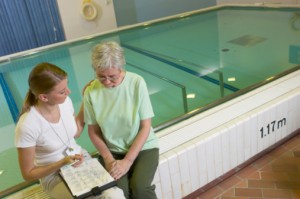

 Osteoarthritis is a common form of arthritis characterized by wear and tear of the cartilage. Over time, cartilage wears thinner and thinner, causing the symptoms of osteoarthritis. Eventually, the two bones on either side of the joint start rubbing together, causing additional pain.
Osteoarthritis is a common form of arthritis characterized by wear and tear of the cartilage. Over time, cartilage wears thinner and thinner, causing the symptoms of osteoarthritis. Eventually, the two bones on either side of the joint start rubbing together, causing additional pain.
There is no cure for osteoarthritis, and once the cartilage is damaged it cannot be repaired. The good news is, the condition can be managed to help ease pain and increase mobility.
An estimated 27 million Americans are affected by osteoarthritis. Common joints affected are the hips, knees, lower back, and neck, as well as small joints like the fingers. Osteoarthritis is primarily brought on by overuse or injury. Another common factor that contributes to osteoarthritis is being overweight, and that is why maintaining a normal weight or losing extra weight is so important for avoiding added stress on already painful joints.
Osteoarthritis can be well managed by (1) improving joint mobility and flexibility, (2) maintaining a healthy weight, and (3) getting adequate amounts of exercise. It may seem you are unable to exercise if your joints are hurting, but moderate physical activity can actually help to relieve joint pain.
Numerous studies have shown that activities such as walking help ease joint pain and aid in weight loss, which is also an integral part of osteoarthritis management. The key to exercising with osteoarthritis is to find activities that – first and foremost – you enjoy and that won’t add extra stress to your joints. Some good examples of osteoarthritis-friendly activities include yoga, tai chi, swimming, and walking. These exercises not only aid in weight loss, but can also improve mobility and flexibility.
Consulting with your doctor prior to beginning an exercise program is always important to ensure it is safe for you. Your doctor may refer you to a physiotherapist to help you develop movement techniques and suggest some basic exercises. Once you get an idea of the proper form and your own range, you can then discuss appropriate exercises for your skill level that will not cause you additional harm but rather help better manage your condition.
Although osteoarthritis cannot be cured or reversed, knowing how to manage the pain can help you get back to doing the things you love.
Copyright © www.orthopaedics.win Bone Health All Rights Reserved